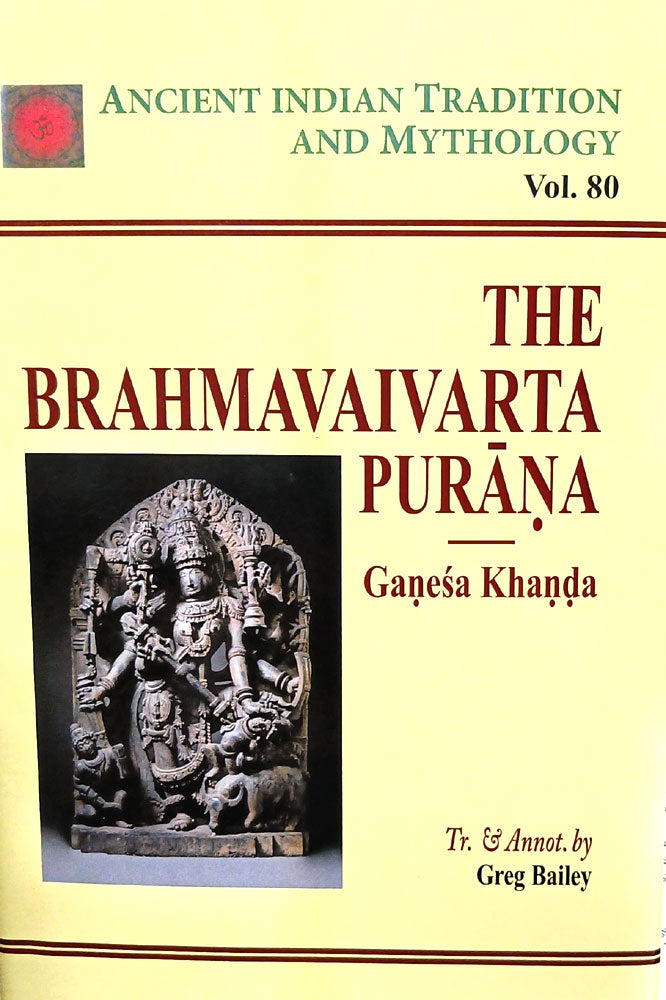The Brahmavaivarta Purana: Ganesa Khanda (AITM Vol. 80): Ancient Indian Tradition And Mythology (Vol. 80)
![]() 100% Genuine New Books
100% Genuine New Books
![]() Fast Shipping with Tracking Number
Fast Shipping with Tracking Number
Secure Payments via UPI, Cards & Wallets
![]() Trusted Support & Easy Returns
Trusted Support & Easy Returns
The Brahmavaivarta Purana: Ganesa Khanda (AITM Vol. 80): Ancient Indian Tradition And Mythology (Vol. 80) - Hardcover is backordered and will ship as soon as it is back in stock.
ISBN : 9789392510397, 939251039
Year of Publication : 2022
Edition : 1st
No. of Pages : 256
Language : English
Condition : New
Publisher: Motilal Banarsidass Publishing House
Free shipping on orders over Rs. 249
Free shipping on orders over Rs. 249
We offer free shipping on orders above Rs. 249 in India. For orders below this threshold, a nominal shipping fee may apply, which will be clearly indicated during the checkout process.
How long will it take to receive my order?
How long will it take to receive my order?
The delivery time varies depending on your location. Generally, orders are processed and shipped within 1-3 business days. Once shipped, you can track and expect your order to arrive within 3-7 business days (the duration may vary depending on your location). For more information, please refer to our shipping policy.
Chat with a Real Person
Chat with a Real Person
WhatsApp chat is dedicated to assisting with after-sales queries regarding delivery, returns, and payments. Click below to initiate chat with us on WhatsApp:
[Bookstaa WhatsApp Chat].
For all other inquiries, please visit our customer support page or email us at support@bookstaa.com.
Couldn't load pickup availability
Description
Description
The first two khaas of the Brahmavaivarta Puraa (BvP) deal with Brahma and Prakti respectively. Both introducing the theology that enables Ka to be treated as identical with the supreme Brahma, and as Viu/ Narayaa in all his forms. Ultimately everything goes back to Ka as the source of power and being even including the mother goddesses who are so prolific in the text, not just in its second khaa. The fourth and final khaa treats the mythology of Ka himself, with focus on his birth, and just before this comes the Gaapatikhaa (GKh).
GKh is one of the few mahapuraas that includes a separate khaa about Gaesa, with the exceptions being the two Gaapatya Puraas the Gaesa and Mudgala Puraas-and the Vinayakamahatmya of the Skanda Puraa. When one reads the other three khaas of the Puraa, it is clearly evident that the GKh fits in perfectly with the principal themes of the entire Puraa, all associated with Ka in his various manifestations and the theology of the mother goddess, especially Radha and Durga. In addition, it continues the practice in many of its chapter of expositing the application of kavacas, dhyanas, mantras and stotras, to the extent that the text is almost a handbook of devotional ritual.
What is striking about the GKh is that it is only incidentally about Gaesa. Only less than ten percent of the entire text deals directly with Gaesa. It touches tangentially on his birth, the loss of his head and the gaining of an elephant head, his status as first to be worshipped in all pujas, his loss of one of his tasks at the hands of parasurama, and his cursing of the Tulasi Plant.
The second half of the GKh is essentially a version of the Parasurama myth. This begins with the intention to tell as well-known episode about Gaesa reflected in his common name Ekadanta. This certainly offers a unique interpretation of its, focusing as it does on the morality of patricide and regicide, and relations between boys and their mothers.
Ka is treated in a manner that can only be called theological. Theologically it is simply stating that all power is located in Viu/ Ka, but in this khaa it is seemingly extended much more than elsewhere. In addition, he is usually depicted as located in Goloka and Vdavana, with the bucolic ka receiving most emphasis in the next. The sakti teachings in this text blend constantly with the Kaite teachings, to the point that both seem to empower each other. That ka looms large is hardly a surprise given the BvP is substantially a Kaite Puraa of 14th – 15th century Bengal and then it could not have omitted existing material on the sakti, given the importance of other goddess worship in Bengal.
There have been two previous translations of the Brahmavaivarta Puraa. The present translation is a fresh translation but the translator has subsequently compared it with the earlier translations to remain transparent to the Sanskrit itself.
About the Publisher

Motilal Banarsidass Publishing House (MLBD)
Motilal Banarsidass Publishing House, popularly known as MLBD, is one of the oldest and most prestigious publishing houses in India, established in 1903.
With over a century of legacy, MLBD has been at the forefront of publishing scholarly works in the fields of Indology, Sanskrit, philosophy, religion, spirituality, yoga, Buddhism, and Jainism.
Renowned for its authenticity and academic rigour, MLBD's books are trusted by researchers, scholars, and readers across the globe.
With more than 5,000 titles in circulation, MLBD continues to uphold its commitment to preserving and promoting India’s rich cultural and philosophical heritage.
Bookstaa is an authorized distributor of MLBD books, ensuring 100% genuine and original publications for our readers.

